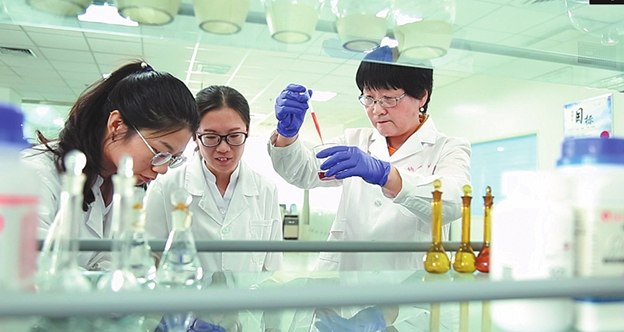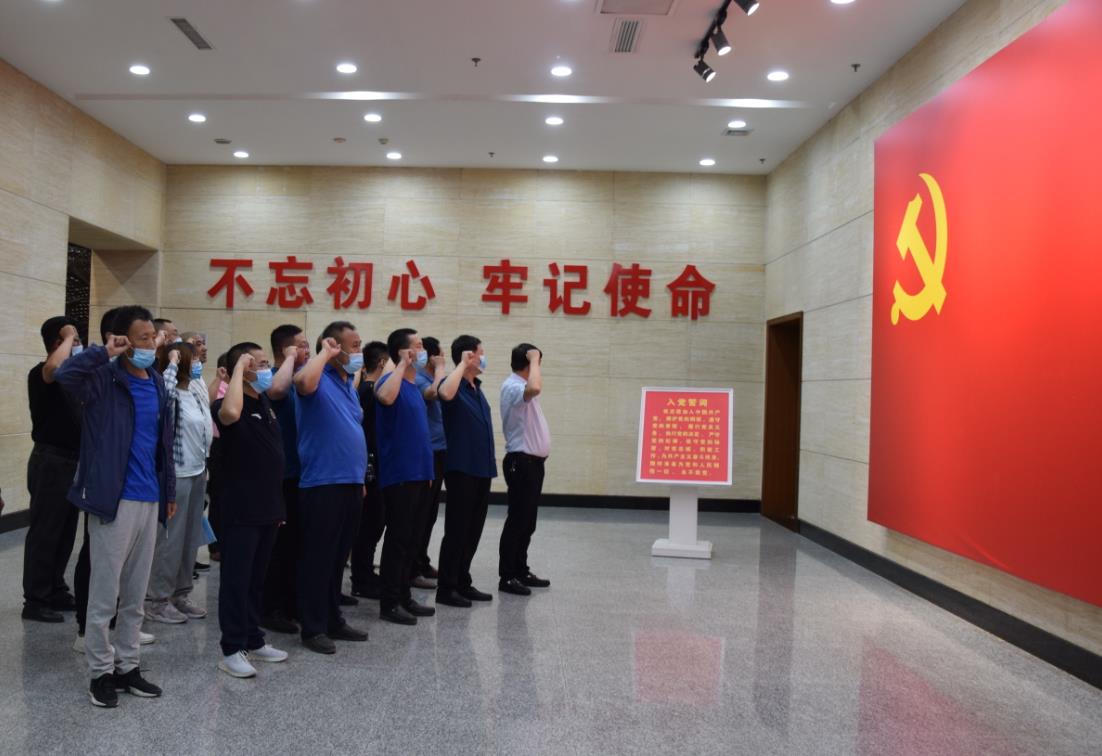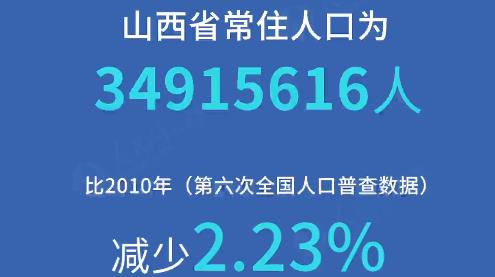
Nanolattix founder Qu Zhican (right) leads technicians in an experiment for product development.
Nanolattix, a new high-tech company in biomedicine and healthcare industries, has grown into one of the unicorns of Shanxi province in less than three years thanks to local government support and its own, unique development and marketing strategies.
A unicorn refers to a startup valued at more than $1 billion within 10 years of its establishment.
Nanolattix, based in Taiyuan, was founded in 2018 by Qu Zhican, a Chinese scholar returning from the United States.
Qu is a Taiyuan native. She had worked and lived in the US as a researcher in biomedicines for about three decades.
"We founded Nanolattix in 2018 as we saw the huge potential of the healthcare industry in China," Qu said. She added that China is now the second-largest market for medicines in the world.
"And Shanxi has put great emphasis on the development of emerging, high-tech industries including biomedicines," Qu said."A number of unicorns and potential unicorns have emerged in these sectors due to strong support from the local government."
Nanolattix currently has a 60-strong research and development team, owns a 1,000-square-meter plant and 800-sq-m laboratory in Taiyuan and a research institution Changzhi.
The company's unique strategy is to use local herbal resources to develop medicines and health products for domestic and international markets. One of its earliest launches were skin care products made of essential oil extracted from peony flowers.
"In the West, companies usually use essential oils extracted from flowers like rose and lavender to produce perfumes and body care products because of the rich resources of the herbs," Qu said.
"Peony is the national flower of China and Shanxi is one of the important production bases of peony," the entrepreneur said. She added that peony essential oil has great market potential because of its similar effects on keeping skin clean and moist and its unique fragrance.
The company plans to promote its peony skin care products to both domestic and overseas markets.
During Spring Festival, an advertisement for Nanolattix peony skin care products was put on a big screen in Times Square, New York City, helping to increase recognition among US consumers.
Qu said behind the successful development of the peony products is Nanolattix's patented nano-extraction technology for herbal essential oils.
She added that similar technologies are used to produce other herb-based biomedicines. The company currently owns 38 patents granted at home and abroad.
Qu said she is especially grateful for the support from the local government.
"We have been offered incentives in land use, fundraising and many other considerate services from the government since the beginning," Qu said.
The government of Shanxi has attached importance to nurturing unicorns.
Local officials said Shanxi has established a database for unicorns and potential unicorns, and they will be prioritized when accessing government support.
The government has set aside a special fund worth 20 billion yuan ($3.08 billion) to support the development of such enterprises, according to officials. They added that authorities are considering new supportive policies.
Guo Yanjie contributed to this story
By YUAN SHENGGAO
 山西路桥:党建引领 建好“四好农村路”山西路桥建设集团党委扎实开展“党建质量提升年”,实施“六大工程”,立足“十四五”高质量、高速度、高效益发展的战略基点,全面提高党建质量和党建引领发展水平,为打造“国内一流的交通基础设施投资、建设、施工现代化企业集团”提供坚强政治保障。
山西路桥:党建引领 建好“四好农村路”山西路桥建设集团党委扎实开展“党建质量提升年”,实施“六大工程”,立足“十四五”高质量、高速度、高效益发展的战略基点,全面提高党建质量和党建引领发展水平,为打造“国内一流的交通基础设施投资、建设、施工现代化企业集团”提供坚强政治保障。
 常住人口3491万 山西人口普查数据"出炉"山西省统计局向社会通报山西省第七次全国人口普查主要数据。数据显示,山西省常住人口为34915616人,比2010年(第六次全国人口普查数据,下同)减少2.23%,年平均减少0.23%。山西省常住人口总量减少,主要受人口流动变化等因素影响。
常住人口3491万 山西人口普查数据"出炉"山西省统计局向社会通报山西省第七次全国人口普查主要数据。数据显示,山西省常住人口为34915616人,比2010年(第六次全国人口普查数据,下同)减少2.23%,年平均减少0.23%。山西省常住人口总量减少,主要受人口流动变化等因素影响。